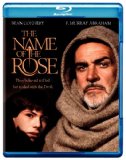| Reviews & Columns |
|
Reviews DVD TV on DVD Blu-ray 4K UHD International DVDs In Theaters Reviews by Studio Video Games Features Collector Series DVDs Easter Egg Database Interviews DVD Talk Radio Feature Articles Columns Anime Talk DVD Savant Horror DVDs The M.O.D. Squad Art House HD Talk Silent DVD
|
DVD Talk Forum |
|
|
| Resources |
|
DVD Price Search Customer Service #'s RCE Info Links |
|
Columns
|
|
|
Name of the Rose, The
Warner Bros. // R // August 2, 2011
List Price: $19.98 [Buy now and save at Amazon]
The Film:
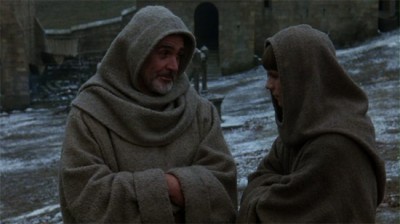 Humor plays a large role in Jean-Jacques Annaud's The Name of the Rose, and not just in breaking up the film's overcast tone. Set in the cold, rock-strewn dampness of a secluded abbey in 14th Century Italy, you'll hear Franciscan friar William of Baskerville -- played by Sean Connery in the midst of his mid-'80s career transition -- carefully utter casual jokes about the location of a toilet and whether a fellow brother wrote documents with his tongue, all while he uses his talent of deduction to solve a series of grim deaths alleged to be the devil's work. His harmless jabs lighten the stony atmosphere, in a place where men wall themselves off from wealth and social interaction to channel God's message; yet we'll soon learn that something as easy to take for granted as laughter, in the eyes of this order, is seen as some form of unbecoming sin.
Humor plays a large role in Jean-Jacques Annaud's The Name of the Rose, and not just in breaking up the film's overcast tone. Set in the cold, rock-strewn dampness of a secluded abbey in 14th Century Italy, you'll hear Franciscan friar William of Baskerville -- played by Sean Connery in the midst of his mid-'80s career transition -- carefully utter casual jokes about the location of a toilet and whether a fellow brother wrote documents with his tongue, all while he uses his talent of deduction to solve a series of grim deaths alleged to be the devil's work. His harmless jabs lighten the stony atmosphere, in a place where men wall themselves off from wealth and social interaction to channel God's message; yet we'll soon learn that something as easy to take for granted as laughter, in the eyes of this order, is seen as some form of unbecoming sin.
William's earnest jesting is rebellious, in a way, and the dichotomy created with his defiance claims a lot of the responsibility for why The Name of the Rose both compels as a mild-mannered thriller and provokes intriguing philosophical thought about the significance of knowledge. With his impressionable apprentice Adso (a young, surprisingly earnest Christian Slater) in tow as they arrive for a debate between the wealth-surrendering Franciscans and the more traditionally-centered Benedictines, he requests permission from the Abbot to investigate a potential suicide of one the abbey's brothers, a man who dabbled in comical imagery within his religious writings. William and Adso are under a time constraint, though; they're racing to find a human answer through reason and investigation before the Holy Inquisition arrives and deals out their own brand of punishment to whomever they deem heretical.
Labeling The Name of the Rose often leads to calling it a historical/medieval whodunit, and it's fully gripping at that base level. As the pair navigates through the snowy abbey's grounds and gathers clues, while several brothers die amidst their investigation by way of gruesome displays with Biblical undertones, it becomes clear that something sinister, human or not, lies within these walls and towers. Grueling murder scenes pair against the eerie landscape -- captured with earthy thickness by Italian cinematographer Tonino Delli Colli and accentuated by James Horner's shivery score -- while a flock of robe-adorned suspects, all grasping at varying degrees of idealism, gasp and scurry at the sight. The environment's a stirring, curious one that's tailor-made for strange cavorting, down to the abbey's wretched, rodent-eating ex-heretic Salvatore (Ron Perlman).
The tension of the Franciscans' sleuthing heightens within the abbey's eerie, foggy atmosphere up in the Italian mountains, which director Annaud and his crew goes to painstaking lengths to faithfully capture the period. Looming gargoyles and tall, gothic structures populate the desolate grounds as William analyzes blood stains, footprints, and authentically-recreated documents, much in the vein of a Franciscan Sherlock Holmes. The textured robes and relics, not to mention the echoic halls and grim shadows, paint the mystery in broad ominous strokes by way of Dante Ferretti's seamless, gripping production design. William claims that he finds the abbey's locale "most stimulating", and I couldn't agree more; the ill-omened essence reflects the darkness that pervades the Benedictine infrastructure, obfuscating its flock but challenging more progressive minds.
It's pretty evident that William of Baskerville is an amalgamation of Sir Arthur Conan Doyle's Sherlock Holmes (if Baskerville in itself wasn't enough, he even telegraphs the "elementary" line in the film) and a gallery of progressive minds from the medieval era, yet Sean Connery wraps his charm around the friar with a degree of wit, authority, and faint egotism that sustains novelty. He doesn't venture outside his range's wheelhouse, still telegraphing the same thick accent and stern glances without much of a tweak, but his poise fits William's prying curiosity. Christian Slater's Adso accentuates his master's flamboyant personality with meager, doe-eyed questioning about morality and the finer points of medieval history, while the abbey's suspicious denizens offer an unusual medley of properly unkempt, overly animated caricatures who demand prying: the alchemist who holds a grin during talk of arsenic, the effeminate glutton who flails his body at night, and Salvatore, the Quasimoto-like heretic who speaks in tongues.
But Annaud's adaptation of Umberto Eco's novel isn't quite as interested in those that could've committed the murders, though, but more the theological motivation behind the deaths; it's one of the rare occasions where the intrigue and weight encapsulated in the "why" greatly outweighs the "who". The maze that William and Adso weave through to unearth the abbey's secrets -- both figuratively and literally, once the gorgeously-captured labyrinth comes into the picture -- winds around the division between the institution's antiquated ideals and the interjection of a progressive's logical deduction of the transpiring events. Any of the brothers could be at the center of the deaths, yet it's the thrust behind their foreboding motives that earn The Name of the Rose its gothic, intellectually provocative appeal: the lengths that some will go to experience, control, or turn a blind eye to knowledge outside their comfort zone.
Annaud allows the events leading to the Holy Inquisition's arrival to sophisticatedly unfold over two-plus hours, enough time to skillfully establish a clear perspective on how staunchly the assorted brothers will hold onto their archaic beliefs. Once the church's grand Inquisitor Bernando Gui (F. Murray Abraham) arrives -- a man whom William shares a history with -- the pace naturally quickens; expectedly overwrought, misguided diatribes from the clergymen rear their head here, yet the situation affords the Franciscan the chance to plead his case against scholarly repression. The Name of the Rose doesn't easily answer whether he's victorious in his quest, which can be seen as either intentionally vague or one of the film's pratfalls. William's efforts, however, do compel one to contemplate the nature of differing points of view and stern intellectual rigidity during the time (and ours), and when draped with historical essence and a grim eye for unraveling mystery, Annaud's execution is no laughing matter.
The Blu-ray:
Video and Audio:
Weaving through the dark and snowy grime of the 12th Century abbey where Jean-Jacques Annaud shot The Name of the Rose, Warner Bros.' 1080p AVC treatment -- expanded to 1.78:1 from the original 1.85:1 framing, just like the DVD -- projects the cold, thick cinematography with discerning awareness of its intended look. Heavy film grain frequently drapes over the image, becoming heavily noticeable in moderately-lit exterior shots, but the small details and generally cool skin tones preserved underneath vaults ahead quite a few notches. Coarseness of the brothers' robes, the textures within close-up shots on parchment, and the weatherworn walls and gargoyles are preserved with a nimble eye. It's in the dark scenes lit by the flickers of fire or the moon's soft rays that impress, with inky contrast levels keeping an eye out for details in the shadows. Some image jitters can occasionally be distracting, inherent likely with the negative, but this clear, compression-free image presents itself with accomplished high-definition execution.
The DTS-HD Master Audio track wears the '80s vintage gracefully on its sleeve, with both the echoing dialogue and James Horner's creepy scoring assertively punctuating the gritty visual aesthetic. When it needs to be quiet, the track allows the subtle spatial resonance to linger in the air without any noticeable hiss, but when it needs to fiercely disrupt the sound design -- the squeal of a pig, the dropping of a book, or the clanging of chains -- it clearly forces them forward. Most important here is the robust amount of dialogue at-play within the gothic interiors and stagnant exteriors; it remains clearly audible and satisfyingly well-balanced, yet bulky in terms of the unavoidable lo-fi essence of the sound design. Overall, though, it's a strong, nimble track that will assuredly satisfy admirers of Annaud's film.
Special Features:
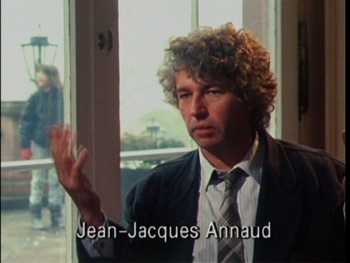 Warner Bros. maintains their modus operandi by carrying over all the special features from the previous standard-definition release of The Name of the Rose, with little added to really up the ante. The only exception to this comes in the French-Language Audio Commentary with Jean-Jacque Annaud, a superior track to the English-Language Audio Commentary that the director recorded in 2002, which has also been included. While the French language track isn't new -- it's been available in Europe for quite some time -- the availability to have its insightful context (clear discussion about the abbey where he shots, the recreated relics, and his fondness/reverence for the novel) in Annaud's more comfortable language is a delight.
Warner Bros. maintains their modus operandi by carrying over all the special features from the previous standard-definition release of The Name of the Rose, with little added to really up the ante. The only exception to this comes in the French-Language Audio Commentary with Jean-Jacque Annaud, a superior track to the English-Language Audio Commentary that the director recorded in 2002, which has also been included. While the French language track isn't new -- it's been available in Europe for quite some time -- the availability to have its insightful context (clear discussion about the abbey where he shots, the recreated relics, and his fondness/reverence for the novel) in Annaud's more comfortable language is a delight.
Alongside that, Warner Bros. have also included the lengthy vintage making-of documentary, The Abbey of Crime: Umberto Eco's The Name of the Rose (43:26, 4x3 SD AVC), which offers a range of insightful off-the-cuff interviews and exquisite behind-the-scenes footage as it extensively discusses the adaptation. The Photo Video Journey (16:06, 16x9 HD AVC) with further retrospective discussion from Jean-Jacque Annaud also makes an appearance, as well as a Theatrical Trailer (2:10, 16x9 SD AVC).
Final Thoughts:
Enveloped in authentic medieval atmosphere as it explores an abbey's harbored secrets, The Name of the Rose is a thinking man's murder mystery. Carefully crafted to replicate the 14th Century aesthetic and very aware of the balance between gloomy and lighter tones, the plot weaves together a few grisly murder scenes, suspicious men of the cloth, and a Sherlock Holmes-like cleric who uses his intuition and intellect to make sense of "the Devil's work". But it's got more going on underneath the surface; enshrouded in historical essence, it also replicates the war over knowledge among scholars during the time, using the tension present in their arguments to fuel the film's suspenseful momentum. In that, Jean Jacques Annaud's adaptation of Umberto Eco's novel -- labeled a "palimpsest", a document that resembles the source but has been reused and altered -- delivers a thoroughly intriguing mix of elements that I've found to be utterly compelling upon repeat screenings. Warner Bros.' Blu-ray carries over all the original supplements with an added bonus in a European commentary track with Annaud, while the film's thick, gritty aesthetic looks and sounds about as good as one can expect in high-definition. Highly Recommended.
Thomas Spurlin, Staff Reviewer -- DVDTalk Reviews | Personal Blog/Site
 Humor plays a large role in Jean-Jacques Annaud's The Name of the Rose, and not just in breaking up the film's overcast tone. Set in the cold, rock-strewn dampness of a secluded abbey in 14th Century Italy, you'll hear Franciscan friar William of Baskerville -- played by Sean Connery in the midst of his mid-'80s career transition -- carefully utter casual jokes about the location of a toilet and whether a fellow brother wrote documents with his tongue, all while he uses his talent of deduction to solve a series of grim deaths alleged to be the devil's work. His harmless jabs lighten the stony atmosphere, in a place where men wall themselves off from wealth and social interaction to channel God's message; yet we'll soon learn that something as easy to take for granted as laughter, in the eyes of this order, is seen as some form of unbecoming sin.
Humor plays a large role in Jean-Jacques Annaud's The Name of the Rose, and not just in breaking up the film's overcast tone. Set in the cold, rock-strewn dampness of a secluded abbey in 14th Century Italy, you'll hear Franciscan friar William of Baskerville -- played by Sean Connery in the midst of his mid-'80s career transition -- carefully utter casual jokes about the location of a toilet and whether a fellow brother wrote documents with his tongue, all while he uses his talent of deduction to solve a series of grim deaths alleged to be the devil's work. His harmless jabs lighten the stony atmosphere, in a place where men wall themselves off from wealth and social interaction to channel God's message; yet we'll soon learn that something as easy to take for granted as laughter, in the eyes of this order, is seen as some form of unbecoming sin. William's earnest jesting is rebellious, in a way, and the dichotomy created with his defiance claims a lot of the responsibility for why The Name of the Rose both compels as a mild-mannered thriller and provokes intriguing philosophical thought about the significance of knowledge. With his impressionable apprentice Adso (a young, surprisingly earnest Christian Slater) in tow as they arrive for a debate between the wealth-surrendering Franciscans and the more traditionally-centered Benedictines, he requests permission from the Abbot to investigate a potential suicide of one the abbey's brothers, a man who dabbled in comical imagery within his religious writings. William and Adso are under a time constraint, though; they're racing to find a human answer through reason and investigation before the Holy Inquisition arrives and deals out their own brand of punishment to whomever they deem heretical.
Labeling The Name of the Rose often leads to calling it a historical/medieval whodunit, and it's fully gripping at that base level. As the pair navigates through the snowy abbey's grounds and gathers clues, while several brothers die amidst their investigation by way of gruesome displays with Biblical undertones, it becomes clear that something sinister, human or not, lies within these walls and towers. Grueling murder scenes pair against the eerie landscape -- captured with earthy thickness by Italian cinematographer Tonino Delli Colli and accentuated by James Horner's shivery score -- while a flock of robe-adorned suspects, all grasping at varying degrees of idealism, gasp and scurry at the sight. The environment's a stirring, curious one that's tailor-made for strange cavorting, down to the abbey's wretched, rodent-eating ex-heretic Salvatore (Ron Perlman).
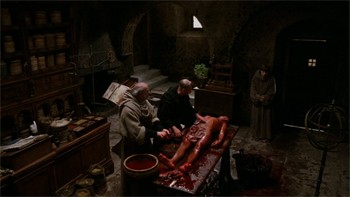 | 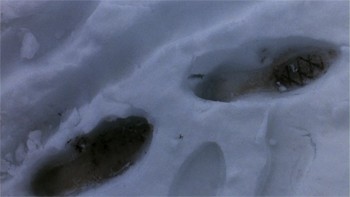 |
The tension of the Franciscans' sleuthing heightens within the abbey's eerie, foggy atmosphere up in the Italian mountains, which director Annaud and his crew goes to painstaking lengths to faithfully capture the period. Looming gargoyles and tall, gothic structures populate the desolate grounds as William analyzes blood stains, footprints, and authentically-recreated documents, much in the vein of a Franciscan Sherlock Holmes. The textured robes and relics, not to mention the echoic halls and grim shadows, paint the mystery in broad ominous strokes by way of Dante Ferretti's seamless, gripping production design. William claims that he finds the abbey's locale "most stimulating", and I couldn't agree more; the ill-omened essence reflects the darkness that pervades the Benedictine infrastructure, obfuscating its flock but challenging more progressive minds.
It's pretty evident that William of Baskerville is an amalgamation of Sir Arthur Conan Doyle's Sherlock Holmes (if Baskerville in itself wasn't enough, he even telegraphs the "elementary" line in the film) and a gallery of progressive minds from the medieval era, yet Sean Connery wraps his charm around the friar with a degree of wit, authority, and faint egotism that sustains novelty. He doesn't venture outside his range's wheelhouse, still telegraphing the same thick accent and stern glances without much of a tweak, but his poise fits William's prying curiosity. Christian Slater's Adso accentuates his master's flamboyant personality with meager, doe-eyed questioning about morality and the finer points of medieval history, while the abbey's suspicious denizens offer an unusual medley of properly unkempt, overly animated caricatures who demand prying: the alchemist who holds a grin during talk of arsenic, the effeminate glutton who flails his body at night, and Salvatore, the Quasimoto-like heretic who speaks in tongues.
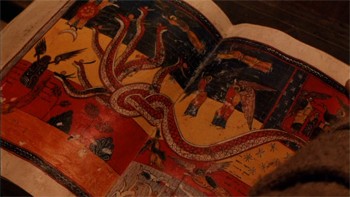 | 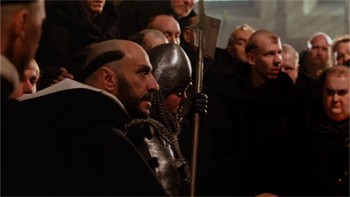 |
But Annaud's adaptation of Umberto Eco's novel isn't quite as interested in those that could've committed the murders, though, but more the theological motivation behind the deaths; it's one of the rare occasions where the intrigue and weight encapsulated in the "why" greatly outweighs the "who". The maze that William and Adso weave through to unearth the abbey's secrets -- both figuratively and literally, once the gorgeously-captured labyrinth comes into the picture -- winds around the division between the institution's antiquated ideals and the interjection of a progressive's logical deduction of the transpiring events. Any of the brothers could be at the center of the deaths, yet it's the thrust behind their foreboding motives that earn The Name of the Rose its gothic, intellectually provocative appeal: the lengths that some will go to experience, control, or turn a blind eye to knowledge outside their comfort zone.
Annaud allows the events leading to the Holy Inquisition's arrival to sophisticatedly unfold over two-plus hours, enough time to skillfully establish a clear perspective on how staunchly the assorted brothers will hold onto their archaic beliefs. Once the church's grand Inquisitor Bernando Gui (F. Murray Abraham) arrives -- a man whom William shares a history with -- the pace naturally quickens; expectedly overwrought, misguided diatribes from the clergymen rear their head here, yet the situation affords the Franciscan the chance to plead his case against scholarly repression. The Name of the Rose doesn't easily answer whether he's victorious in his quest, which can be seen as either intentionally vague or one of the film's pratfalls. William's efforts, however, do compel one to contemplate the nature of differing points of view and stern intellectual rigidity during the time (and ours), and when draped with historical essence and a grim eye for unraveling mystery, Annaud's execution is no laughing matter.
The Blu-ray:
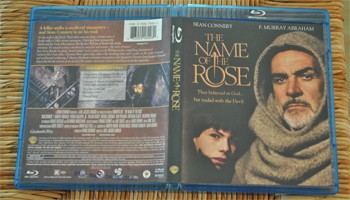 | 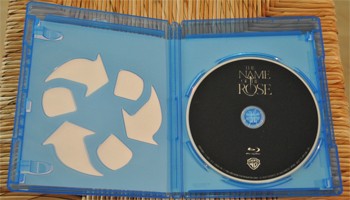 |
Video and Audio:
Weaving through the dark and snowy grime of the 12th Century abbey where Jean-Jacques Annaud shot The Name of the Rose, Warner Bros.' 1080p AVC treatment -- expanded to 1.78:1 from the original 1.85:1 framing, just like the DVD -- projects the cold, thick cinematography with discerning awareness of its intended look. Heavy film grain frequently drapes over the image, becoming heavily noticeable in moderately-lit exterior shots, but the small details and generally cool skin tones preserved underneath vaults ahead quite a few notches. Coarseness of the brothers' robes, the textures within close-up shots on parchment, and the weatherworn walls and gargoyles are preserved with a nimble eye. It's in the dark scenes lit by the flickers of fire or the moon's soft rays that impress, with inky contrast levels keeping an eye out for details in the shadows. Some image jitters can occasionally be distracting, inherent likely with the negative, but this clear, compression-free image presents itself with accomplished high-definition execution.
The DTS-HD Master Audio track wears the '80s vintage gracefully on its sleeve, with both the echoing dialogue and James Horner's creepy scoring assertively punctuating the gritty visual aesthetic. When it needs to be quiet, the track allows the subtle spatial resonance to linger in the air without any noticeable hiss, but when it needs to fiercely disrupt the sound design -- the squeal of a pig, the dropping of a book, or the clanging of chains -- it clearly forces them forward. Most important here is the robust amount of dialogue at-play within the gothic interiors and stagnant exteriors; it remains clearly audible and satisfyingly well-balanced, yet bulky in terms of the unavoidable lo-fi essence of the sound design. Overall, though, it's a strong, nimble track that will assuredly satisfy admirers of Annaud's film.
Special Features:
 Warner Bros. maintains their modus operandi by carrying over all the special features from the previous standard-definition release of The Name of the Rose, with little added to really up the ante. The only exception to this comes in the French-Language Audio Commentary with Jean-Jacque Annaud, a superior track to the English-Language Audio Commentary that the director recorded in 2002, which has also been included. While the French language track isn't new -- it's been available in Europe for quite some time -- the availability to have its insightful context (clear discussion about the abbey where he shots, the recreated relics, and his fondness/reverence for the novel) in Annaud's more comfortable language is a delight.
Warner Bros. maintains their modus operandi by carrying over all the special features from the previous standard-definition release of The Name of the Rose, with little added to really up the ante. The only exception to this comes in the French-Language Audio Commentary with Jean-Jacque Annaud, a superior track to the English-Language Audio Commentary that the director recorded in 2002, which has also been included. While the French language track isn't new -- it's been available in Europe for quite some time -- the availability to have its insightful context (clear discussion about the abbey where he shots, the recreated relics, and his fondness/reverence for the novel) in Annaud's more comfortable language is a delight. Alongside that, Warner Bros. have also included the lengthy vintage making-of documentary, The Abbey of Crime: Umberto Eco's The Name of the Rose (43:26, 4x3 SD AVC), which offers a range of insightful off-the-cuff interviews and exquisite behind-the-scenes footage as it extensively discusses the adaptation. The Photo Video Journey (16:06, 16x9 HD AVC) with further retrospective discussion from Jean-Jacque Annaud also makes an appearance, as well as a Theatrical Trailer (2:10, 16x9 SD AVC).
Final Thoughts:
Enveloped in authentic medieval atmosphere as it explores an abbey's harbored secrets, The Name of the Rose is a thinking man's murder mystery. Carefully crafted to replicate the 14th Century aesthetic and very aware of the balance between gloomy and lighter tones, the plot weaves together a few grisly murder scenes, suspicious men of the cloth, and a Sherlock Holmes-like cleric who uses his intuition and intellect to make sense of "the Devil's work". But it's got more going on underneath the surface; enshrouded in historical essence, it also replicates the war over knowledge among scholars during the time, using the tension present in their arguments to fuel the film's suspenseful momentum. In that, Jean Jacques Annaud's adaptation of Umberto Eco's novel -- labeled a "palimpsest", a document that resembles the source but has been reused and altered -- delivers a thoroughly intriguing mix of elements that I've found to be utterly compelling upon repeat screenings. Warner Bros.' Blu-ray carries over all the original supplements with an added bonus in a European commentary track with Annaud, while the film's thick, gritty aesthetic looks and sounds about as good as one can expect in high-definition. Highly Recommended.
|
| Popular Reviews |
| Sponsored Links |
|
|
| Sponsored Links |
|
|
| Release List | Reviews | Shop | Newsletter | Forum | DVD Giveaways | Blu-Ray | Advertise |
|
Copyright 2024 DVDTalk.com All Rights Reserved. Legal Info, Privacy Policy, Terms of Use,
Manage Preferences,
Your Privacy Choices | |||||||









